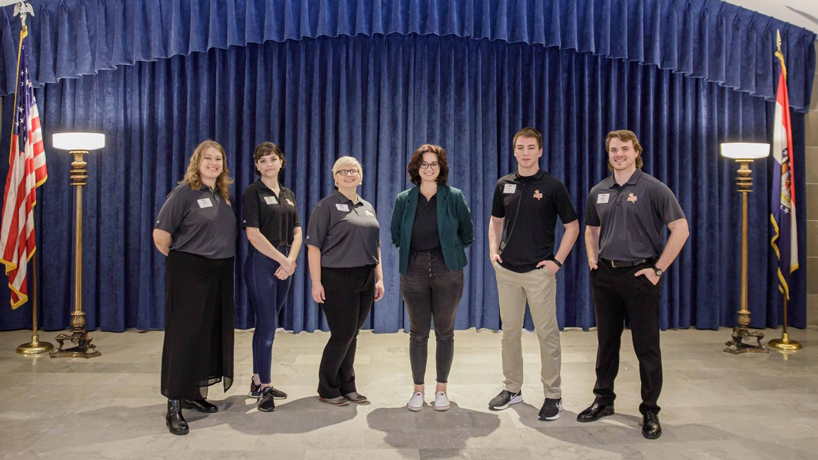
UMSL students (from left) Anne Brown, Bridget Muise, Breara Wenzel, Maya Harter, Owen Ireton and Lucas Lauter took part in the University of Missouri System Undergraduate Research Day at the Missouri Capitol in Jefferson City, Missouri. (Photo courtesy of University of Missouri System)
Six University of Missouri–St. Louis students showcased their work for and took questions from legislators, government officials and other stakeholders at the Missouri Capitol during the University of Missouri System Undergraduate Research Day on Monday in Jefferson City, Missouri.
Sociology and psychology major Anne Brown, marketing and supply chain management major Maya Harter, biology and pre-med major Owen Ireton, biology major Lucas Lauter, clinic psychology major Bridget Muise and nursing major Breara Wenzel joined 30 other students from across the UM System’s other three universities for the event, which was held in person for the first time since 2019.
“Our students are provided unique opportunities to work alongside our talented faculty to conduct cutting-edge and groundbreaking research on our four campuses every day,” UM System President Mun Choi wrote in a letter to legislators. “These experiences, which range from science to medicine to the humanities, help to prepare our students for graduate and professional studies at prominent universities as well as careers in leading industries.”
Learn more about each UMSL student and their research:
Anne Brown
Hometown: St. Louis
Major: Sociology and psychology
Faculty mentor: Larry Irons
“Experiences with Community Health Work among clients at Bridge of Hope”
Brown has been assessing how management, staff and clients view Bridge of Hope Ministries’ newly implemented program to assist the unhoused. Specifically, she’s exploring whether the application of onsite client-based community health services and holistic care improve clients’ perceived stability and quality of life. She’s been conducting face-to-face, in-depth interviews at the Bridge of Hope day shelter in the Ville neighborhood of north St. Louis.
Maya Harter
Hometown: St. Louis
Major: Marketing/supply chain management
Faculty mentors: Trilce Encarnación and Matias Enz
“Comparative Performance of Food and Nutrition Security Operations”
Harter’s research examines the different operational features of food and nutrition security supply chain operations. The results offer insight into the level of effectiveness of different approaches to mitigate food and nutrition insecurity. Harter has conducted in-depth interviews in the St. Louis metropolitan area to gather data about the supply chain configurations employed by different organizations. She shares chief conclusions and policy implications.
Owen Ireton
Hometown: Warrenton, Missouri
Major: Biology/pre-med
Faculty mentor: Aimee Dunlap
“Competition between honey bees (Apis mellifera) and native bees: an investigation in urban community gardens”
The goal of Ireton’s study has been to document interactions between native bees and European honeybees in urban community gardens to elucidate differences in the number of competitive interactions and the competitive behaviors used by bees in urban regions. Ireton filmed flowers in three community gardens in St. Louis – one that has four managed honey bee colonies and two that do not. He quantified known competitive behaviors for bees, including chasing, dive bombing, pollen robbing and attacks, and found significant differences in both the frequency and type of competitive interactions between bee species and across surveyed community gardens. The information gleaned will help improve understanding of the effects of introduced honeybee colonies in local landscapes.
Lucas Lauter
Hometown: Arnold, Missouri
Major: Biology
Faculty mentor: Aimee Dunlap
“The Effects of Floral Attributes and Conspecifics on Bumble Bee Forager Memory”
Lauter has been training and testing three floral cues and a single social cue to see how the different types of cues affect bees’ learning and memory of rewarding flower types. He’s been rewarding bees for foraging on a specific floral or social cue while discouraging foraging of the control flower. The reward offered is in the form of a high percentage sugar solution while discouraging is done through water. The bees that drink the high percentage sugar solution should observe the cue associated with the reward and use that information to forage on flowers of the same type. Once a cue has been learned, Lauter removes the bees for a period of time and then tests them again to observe memory length and foraging efficiency. The research provides insight into bumble bee pollination behavior.
Bridget Muise
Hometown: O’Fallon, Missouri
Major: Clinical psychology
Faculty mentor: Bettina Casad
“Effects of Threatening Education Environments on Minoritized Students in STEM”
Muise randomly assigned a group of females with different racial identities to threatening or safe learning conditions and examined the effects of each. The threatening intellectual environment was created in a virtual classroom hosted by Second Life with a white male professor who made a disparaging comment during a lecture; a racially homogenous (all white) class; a male-dominated classroom and a male professor’s office with “geeky” and sexually themed science décor. The safe virtual academic environment included a white male professor who made a comment about gender equality; a racially diverse class; a gender-balanced classroom and a male professor’s office with neutral décor.
Breara Wenzel
Hometown: Fenton, Missouri
Major: Nursing (BSN)
Faculty mentors: April Sun, Kim Werner
“Improving cultural competence of hospice care workers: What makes it work?”
Ethnic disparities exist in end-of-life patient care that cause problems in areas such as satisfaction, communication and pain management. Interventions that can reduce these disparities need to be identified. Wenzel’s study examined the impact of cultural diversity and sensitivity training on health care professionals and its importance for decreasing disparities experienced by ethnic minorities in hospice. She looked at the characteristics of effective training programs for improving healthcare professionals’ cultural competency, in palliative and hospice care among ethnic minorities.
For more information on Undergraduate Research Day, visit: www.umsystem.edu/ums/red/undergraduate_research_day














